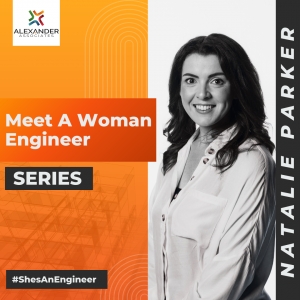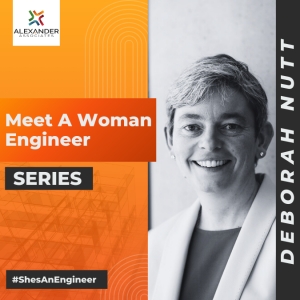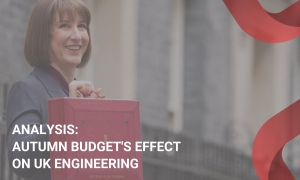MEET A WOMAN ENGINEER - SALMA ALAREFI
Salma Alarefi is a Lecturer in Engineering Education at the University of Leeds, where she teaches and supports the development of future engineers. Her expertise focuses on renewable energy systems, and she delivers lectures, laboratory sessions, and supervises students' technical projects.
Salma developed an interest in engineering during school, where she felt most comfortable in maths and physics classes. As a person who stammers, she enjoyed problem-solving activities that allowed for minimal verbal interaction. The satisfaction she gained from solving problems boosted her confidence in choosing engineering as a career. Inspired by her maths teacher, who demonstrated how math applies to everyday life, Salma became passionate about STEM, seeing it as a way to make a meaningful impact while staying within her comfort zone.
Today, Salma balances teaching, tutoring, project supervision, and research in engineering education. She holds a PhD and is a Fellow of the Higher Education Academy.
As a finalist for the IET Young Woman Engineer of the Year 2024, Salma is a passionate advocate for young girls in engineering. Having faced challenges as a woman in the field, she now uses these experiences as motivation to push forward.
Today, we dive into her story, exploring the experiences and lessons that have driven her success and shaped her journey.
When did you realise that a career in engineering was right for you? Was there a particular moment in your life?
At school, as a person who stammers I always felt more comfortable during maths and physics classes. I enjoyed indulging in problem solving activities that I could do on my own with minimal verbal interaction with my peers. From a very early stage of my education the satisfaction I used to get from being able to solve problems made me more assertive about choosing to study engineering. I was always fascinated about how my maths teacher always advocated for how maths is applied to every aspect of our everyday life ( measurements of ingredients, alignment of furniture, time and time management and schedule of our life, etc ) that made me even more passionate about STEM as it meant I could still have the chance to make an impact on everyday life without having to do something that would throw me out of my comfort zone
What does an average day look like for you?
The nature of my job, in teaching and supporting the learning of future generations, allows me great flexibility to be involved with engineering through different lenses. Ranging from technical hand on through my lab teaching and supervision of student projects, tutoring students and helping them with job applications and mentoring students in placement, to doing research to gain more insights on the experience of engineering students, contributing to engineering education policies and pedagogy.
How did you get into this career? What qualifications did you get?
I hold a PhD and during my PhD studies I worked as a lab demonstrator to support the delivery of lab sessions which allowed me to certify as associate fellow of higher education academy.
Did you face any challenges with your career decision as a woman engineer?
Of course I did and continue to, it was very challenging at the start and I remember all the emotions and moments of loneliness that I experienced. The thing I do differently now is that I use these as an opportunity to encourage myself to push more. I do not accept to be victimised for being a minority anymore.
What advice would you give to young girls considering a career in engineering?
Engineering is not just about field work. An engineering career, like engineering itself, is full of creative opportunities, is continuously evolving and dynamic but in a positive way. Society needs solutions and innovation that can address challenges that are specific to women and that can only be done by having more women on board. If you get on board, you have a great chance to make a lasting impact.
Do you have any funny or interesting stories from your career as an engineer?
The funniest memory was during my first lecture, when every student who walked into the lecture theatre and saw me got their phone out to check if they were in the correct lecture/venue. After they’d charge me, they would look at me and smile apologetically. I do not blame them as you do not see many women lectures in engineering, let alone a midline female lecture.
Curious about our #ShesAnEngineer series? Dive into our video series featuring women who are driving change and breaking down barriers in this male-dominated field. Discover their inspiring stories here: https://www.alexander-assoc.co.uk/women-in-engineering.
MEET A WOMAN ENGINEER - NATALIE PARKER
Natalie Parker is a Technical Specialist for the Operational Technology Group at Sellafield Ltd. Natalie’s passion for STEM, especially maths and science, led her to explore an apprenticeship in Control Systems, quickly advancing from apprentice to senior engineer. Today, she provides technical advice, supports projects, and manages a team of nine engineers, driving collaboration and innovation across facility teams.
As a finalist for the IET Young Woman Engineer of the Year 2024, Natalie is a strong advocate for young girls in engineering, highlighting the field's vast opportunities. She co-leads Sellafield’s Women in Technology group, working to achieve gender balance, and created the "Get Wired…Get Coding" workshop to inspire primary school students to explore electrical circuits and programming.
Today, we explore her journey and how choosing the non-traditional university route has given her valuable hands-on experience and encourages more STEM students to consider careers in engineering.
When did you realise that a career in engineering was right for you? Was there a particular moment in your life?
I always had a passion for STEM subjects throughout school in particular maths and science. I went to study my A-levels at a time the tuition fees had rose from £3000 and year to £9000. At this moment I realised I didn’t know what I wanted to study at university so started to explore apprenticeships available in the local area and discovered Control Systems which appealed to me. This was the first step into my engineering career.
What does an average day look like for you?
My days are extremely varied. I can be undertaking technical teaching to degree apprentices and acting as their line manager, undertaking assurance activities and investigations, providing technical support to projects and front-line engineering teams, carrying out maintenance improvements within my department, leading on work experience, leading the Women in Technology group.
How did you get into this career?
I began my Control Systems apprenticeship in September 2011. I stumbled across this apprenticeship not really knowing much about control systems but the involvement of maths and problem solving really appealed to me. I then spent the next 7 years developing from an apprentice to a senior control systems engineer. I then spent some time in the project team before entering my current role as a Control Systems Technical Specialist.
What qualifications have you earned?
I obtained a 1st class honour in Plant Engineering (Engineering Systems).
Did you face any challenges with your career decision as a woman engineer?
When I had my children who are now 4 and 5, I suffered a bit of negativity with regards to my career and the unconscious bias of individuals. However, I have used this to my advantage and motivation to upskill management and this has given me the tools to progress in my career.
What advice would you give to young girls considering a career in engineering?
The world of engineering is so vast, and the opportunities are endless. As an engineer you can work all over the world in many different industries. It’s an exciting and ever-changing field to work in.
Do you have any interesting stories from your career as an engineer?
During my 7 years as a front-line engineer, I was involved in a very complex system modification due to problems with the facility equipment. The result from the modification enabled the facility to finish reprocessing nuclear fuel and I was able to sit with the operations team and watch the final shear. Very proud moment!
I have also loved running work experience and welcoming some of the students back as our control systems degree apprentices.
Curious about our #ShesAnEngineer series? Dive into our video series featuring women who are driving change and breaking down barriers in this male-dominated field. Discover their inspiring stories here: https://www.alexander-assoc.co.uk/women-in-engineering.
MEET A WOMAN ENGINEER - ERIN LOWE
Erin is a third-year Electrical Engineering Apprentice at Mazak, where she specialises in the CV5-500 machine line. From a young age, Erin knew that engineering was her true calling. While other kids were into trends and toys, Erin found herself captivated by model kits, electrical circuits, and carpentry classes. She asked for tools, not make-up, and found joy in building and problem-solving. Her passion for hands-on work and engineering talent were evident early on—she won first place in the national ‘Who Wants to Be an Engineer?’ competition while still in Year 11.
Fast forward to today, and Erin is flourishing in her apprenticeship, handling electrical assembly, calibration, and safety checks on complex machines, while also contributing to local charity initiatives, raising nearly £2,000 over the past year. As an apprentice ambassador, she champions STEM, participating in career fairs and hosting factory tours. Recently named a finalist for IET Young Woman Engineer of the Year 2024, Erin is inspiring the next generation of engineers.
Today, we explore her journey and how choosing the non-traditional university route has allowed her to gain valuable hands-on experience.
When did you realise that a career in engineering was right for you? Was there a particular moment in your life?
I have long known that I wanted to follow in my grandfather’s footsteps into a career in engineering. As a child I loved model and electrical circuit building kits. I asked for tool kits and a soldering iron whilst friends were asking for clothes and make-up, and I went to carpentry classes whilst others played sports. During year 11, I even won first place after entering the national competition ‘Who wants to be an engineer?’. Therefore, the question for me was never about what I wanted to study, but how.
What does an average day look like for you?
As an electrical apprentice at Mazak, I spend my day-to-day work life out on the factory floor. Now that I am in my third year, I am just working in one area, the CV5-500 machine line. My job is to electrically assemble and adjust the machine so that it works correctly and is safe to operate. I am also still working towards my qualification, so I spend a couple of hours each week working on written work, and I hope to finish my apprenticeship by August.
As an active member of our apprentice charity committee, I assist with the organisation and running of all our projects. Over the last year we have runover a dozen successful events, raising almost £2,000 in total in aid of various local charities.
Part of being a Mazak apprentice is being an apprentice ambassador. I believe that STEM outreach events are so beneficial to the community because they help young people know what they want to do as their career. However, they are also beneficial to my own personal growth as I am naturally a very shy person, and they have helped me leave my comfort zone. Through Mazak, I have had the opportunity to attend numerous career fairs, give many presentations, and many in-house events too (mostly factory tours). This year, I helped with at least 1 event every fortnight.
How did you get into this career? What qualifications did you get?
Whilst in Year 10, a local engineering company contacted my school to offer a small number of cadetship placements. I immediately submitted my application and was lucky enough to be selected onto the programme where I received firsthand experience of what it would be like to be one of their employees. I found being totally immersed into the world of work totally mind blowing. Exchanging one uniform for another, the sense of pride I experienced in my new, albeit temporary, role was totally unexpected. My new colleagues treated me with respect and willingly demonstrated their skills. When the time came, I left saddened but hopeful that one day I would be given an opportunity to return.
After completing my exams, as a very able student leaving school, I could have easily opted to follow my peers along the well-travelled route through a university degree. However, as I have always found practical learning opportunities to be more enjoyable, engaging and beneficial, the apprenticeship route seemed much more suited to my preferred learning style and therefore so much more appealing. Additionally, my awareness that many graduates leave university with no guarantee of work in their chosen field and huge student debts, was also influential in my decision-making process. It made financial sense to me to earn a wage whilst training alongside experts, guaranteeing my resulting qualifications and experience would be relevant and marketable when my course finished.
Upon discovering that the company I had attended for my cadetship offered a comprehensive and well renowned electrical engineering apprenticeship programme, my mind was made up. I applied, and following an intensely competitive application process, I was successfully offered the role. I am now in my third year and am thrilled about my progress so far. Choosing an apprenticeship has proven to be the best decision that I could have made.
Did you face any challenges with your career decision as a woman engineer?
Going from a school environment where there are many other young women around to an environment where there were hardly any was initially quite daunting. However, Mazak staff made me feel welcome and the workplace didn’t feel so intimidating any more.
What advice would you give to young girls considering a career in engineering?
My first piece of advice would be to talk to your career’s advisors about work experience opportunities, as they can often help you to find companies that you would be well suited to working for in the future. This both gives you relevant workplace experience, but also makes your applications stand out when applying for jobs/apprenticeships. I would also go to as many open events and career fairs that you can, as this well help you find the job that you want to do in the future. Yamazaki Mazak will be holding a woman in engineering event on the 11th of December, where the goal is to get more young women into engineering and is open to everyone.
I would also highly recommend an apprenticeship instead of going down the university path. This means that you can earn whilst you earn, gain relevant industry experience, meet likeminded people, and get a head start into your career. If this is something that sounds appealing, an apprenticeship would be perfect for you. One thing to remember is to apply earlier rather than later, as lots of companies will close their job adverts once they have enough applicants. Another thing to consider is not only applying directly to a company, use a service that will help you find the right apprenticeship for you. For example, Hereford and Worcestershire Group Training Association will send your CV to as many companies as they can and will help prepare you for life as an apprentice.
Do you have any standout memories from your career as an engineer?
My company, Yamazaki Mazak UK ltd, holds an open house every year for existing and potential customers and they all receive a factory tour during their visit. It is apprentices that give these tours. It was one of my last tours of the week, having given around 7 by this point, I was then given a small group of 3 people, an engineer, his daughter, and an apprentice. This was one of my most enjoyable tours and it ended up taking over 2 hours, instead of the usual 1.5 hours, because they were so keen and asking so many questions about Mazak and my experience as an apprentice.
In April, I was given the opportunity to represent my company at the MACH show in Birmingham and give tours to schools that were visiting. As I was conducting one of these tours, I heard my name being shouted from across the hall and I looked around but didn’t see someone from my company. Instead, I saw the people that I toured around Mazak during the open house. I felt honoured that they remembered me from an event many months ago, but that they also wanted to reconnect. Thank you to Metal Seagulls Ltd for this experience.
Curious about our #ShesAnEngineer series? Dive into our video series featuring women who are driving change and breaking down barriers in this male-dominated field. Discover their inspiring stories here: https://www.alexander-assoc.co.uk/women-in-engineering.
MEET A WOMAN ENGINEER - DEBORAH NUTT
Deborah is a Senior Director at Arcadis, based in London, with a distinguished career in civil engineering that began after an early passion for constructing things and a pivotal moment at a summer engineering course at Salford University in 1991.
Over the course of her career, Deborah has contributed to high-profile projects like flood defence schemes along the Thames Estuary and the innovative Medmerry Managed Realignment, which transformed the British coastline.
After earning a 2:1 in Civil Engineering and becoming a Chartered Engineer in 2002, she quickly advanced in her career, benefiting from a supportive family and educational environment. Now serving as an NEC Project Manager, she oversees complex projects, where every day brings new challenges and opportunities.
A strong advocate for diversity in engineering, Deborah encourages young girls to pursue careers in the built environment, highlighting the chance to make a meaningful impact.
Today, we dive into her story, exploring the experiences and lessons that have driven her success and shaped her journey.
When did you realise that a career in engineering was right for you? Was there a particular moment in your life?
As a kid I had always liked toys like Lego, Meccano or making dens in the garden …oh and obviously mud pies! So clearly from an early age I liked to construct things and enjoyed the outdoors! I opted for science and maths at A level as I thought that would get me further rather than what I was good at, Music, French and Humanities!
The teacher I babysat suggested engineering as she said, “I could see you as a civil engineer” and I had no idea what that was. I was lucky enough to attend an INSIGHT For Girls course at Salford University in the summer of 1991 that explored all forms of engineering, and it was here I decided that civil engineering was a career I’d be interested in, so I guess it was on that course that defined my career choice!
What does an average day look like for you?
My days are very varied, my current role is as an NEC Project Manager administering contracts for the Environment Agency delivering flood defence schemes across the Thames Estuary. My day can involve visits to site to monitor progress and resolve issues, meetings in offices with team members, engaging and talking to clients, assessing change on my projects and reviewing programmes. It’s rarely the same!
How did you get into this career?
I applied to various universities and was accepted back to Salford University to study Civil Engineering with an Industrial Year, and I was fortunate enough to be successful at my second year interview and gained a place at Costain for my year out. Here I was able to build on my theoretical knowledge as well as getting a good understanding of what life was like as a site engineer!
What qualifications did you get?
I got 4 A Levels (just) in Maths, Physics, Chemistry and General Studies. I then went to university and gained a 2:1 in Civil Engineering and then in 2002 I became a Chartered Civil Engineer.
Did you face any challenges with your career decision as a woman engineer?
I was fortunate as I didn’t. My parents were very supportive, and my teachers encouraged me.
What advice would you give to young girls considering a career in engineering?
If you have a passion for the built environment, then do it.
If you want to make a difference, then do it.
If you want to improve the quality of life, then do it.
Basically no one should be stopping you from doing it. It’s a varied and interesting career and can take you anywhere in the world if you want it to. It’s not a “dirty” career as was once thought and construction companies are actively seeking diversity in their workforce and as such the working conditions have improved vastly since I started my career!
Do you have any standout memories from your career as an engineer?
Not sure if it’s a funny story but when I started back at Costain after my career I learnt a valuable lesson about record keeping. In a road construction you have to clearly mark out where things like drainage gullies and draw pits are. I made a mistake and couldn’t find one in a footpath before it was to be tarmacked…so I was given a shovel and a pick axe and told to “find it”…I did…but I didn’t overlook a measurement again!
The project I am most proud of is Medmerry Managed Realignment as this was innovative and unique. It was a flood defence scheme that involved a 7km embankment in land from the beach between Selsey and Bracklesham with the aim was to provide not only flood defence but also a variety of habitats. We did this through a 110m breach (create a gap) in the shingle beach and allowed the sea in to create the variety of habitats. You can see this realigned coastline from the air and it's changed the shape of the British coast line for ever…that’s something to be proud of!
Curious about our #ShesAnEngineer series? Dive into our video series featuring women who are driving change and breaking down barriers in this male-dominated field. Discover their inspiring stories here: https://www.alexander-assoc.co.uk/women-in-engineering.
For MEICA commissioning engineers working in the UK water sector, stepping away from a permanent role can feel daunting. The stability of a full-time position, coupled with a predictable salary and benefits, makes it tempting to stay. However, the shifting landscape in the UK water industry and evolving professional aspirations have opened up new opportunities. For many, moving to contract or freelance work as a MEICA commissioning engineer could not only be a positive step but a truly empowering career move. Here are key reasons why now is a great time to consider taking that leap.
1. Significant Demand for Skilled Contractors
The UK water industry is navigating a crucial period of change, with AMP7 wrapping up and AMP8 on the horizon. Water companies are under immense pressure to meet regulatory requirements, improve infrastructure resilience, and address sustainability goals. This ambitious agenda has led to a steady demand for MEICA commissioning engineers. Contractors are in high demand because they offer flexibility and expertise for these high-stakes projects without long-term commitments, making it easier for companies to scale resources up or down. Engineers moving to freelance work are likely to find numerous projects that align with their skills and expertise, creating a steady flow of opportunities.
2. Higher Earning Potential
While permanent roles offer a steady salary and benefits package, contract or freelance positions often come with significantly higher day rates. The demand for experienced commissioning engineers has driven competitive rates in the sector, with day rates often reaching £500–£600, depending on location and project scope. This increase in earning potential can provide the financial flexibility to focus on the types of projects that align best with personal career goals, and it can also make it possible to take breaks between contracts without sacrificing income.
3. Diverse Project Experience
Moving to contract work means engineers can diversify their experience by working across a range of projects, water companies, and contractors. Unlike a permanent role that may focus on a particular aspect of water treatment or wastewater management, contract work can allow commissioning engineers to contribute to various projects across the water cycle. This breadth of experience can be incredibly valuable for career development, broadening technical knowledge and expanding networks across the industry.
4. Enhanced Skill Development and Flexibility
Contracting offers greater control over one’s career path and skill development. By taking on a variety of projects, engineers can hone both technical and soft skills in unique ways. Working on short-term or high-impact projects sharpens problem-solving abilities, adaptability, and client management skills. With each new contract, engineers have the chance to learn, grow, and bring fresh expertise to the table. Moreover, contractors can choose projects that align with their career goals or preferred work-life balance, whether that’s prioritising more challenging roles, unique projects, or even jobs closer to home.
5. Opportunities to Specialise
Contract work can create opportunities for commissioning engineers to specialise in niche areas, such as automation systems, telemetry, or energy-efficient water treatment processes. As technology advances in the sector, these specialised skills are increasingly valuable, allowing engineers to command higher rates and more selective projects. Permanent roles often don’t allow for this kind of focus, as the scope of responsibilities may be too broad or set by company priorities. Contract roles, however, provide the freedom to dive deeper into specific areas, establishing the engineer as an expert in a high-demand field.
6. Networking and Industry Recognition
Transitioning to contract work enables engineers to work with multiple companies, meet other industry professionals, and establish a strong reputation across the sector. Each contract offers a unique chance to build relationships and increase visibility in the water industry. When word gets out that a commissioning engineer consistently delivers quality work, it opens the door to referrals and repeat contracts. This networking power can enhance long-term career prospects and may lead to future roles that align even better with personal and professional aspirations.
7. Contributing to the Industry's Future
The UK water sector is at a pivotal moment, with a strong focus on sustainable development and innovation. As a contractor, MEICA commissioning engineers have the chance to contribute to groundbreaking projects that make a lasting impact, such as integrating renewable energy into water treatment processes, improving wastewater management to protect ecosystems, or deploying advanced technology to improve resource efficiency. Contractors often work on forward-thinking projects, enabling them to contribute to meaningful changes that shape the future of the industry.
8. Work-Life Balance and Flexibility
While contracting does come with certain responsibilities like managing taxes and maintaining insurance, it also offers flexibility in scheduling and work-life balance. Contractors can often set their own hours, take breaks between contracts, and prioritize personal life or family time when needed. This control over time and availability makes contracting an appealing choice for many, allowing them to better align work commitments with personal life.
Is It Right for You?
Leaving a permanent role is a big decision, and the transition to contract work can feel complex. As an agency that has placed commissioning engineers in the water sector for over two decades—starting from AMP3—we have guided hundreds of engineers through the shift from permanent to contract roles. In fact, we’ve maintained back-to-back contracts for our contractors for 20 years, with one commissioning engineer recently entering his sixth contract with us since making the leap in 2011.
With clients across the UK and overseas, we are uniquely positioned to support commissioning engineers who want to take advantage of the flexibility and growth potential of contract work. We’ll guide you through each step of setting up a Limited Company or choosing an Umbrella Company, and when one contract ends, we work tirelessly to keep you moving forward. Making the transition with us ensures you’ll always have a dedicated partner, ready to secure your next opportunity.
Please get in touch with Ruth Parker today - ruth.parker@alexander-assoc.co.uk or call 01959 562 572
Chancellor Rachel Reeves made her inaugural budget speech on Wednesday, representing Labour's first fiscal statement in 14 years. Her extensive address emphasised economic growth and fiscal responsibility, introducing significant tax reforms and new approach for government borrowing.
The government's announcement regarding adjustments to fiscal rules today indicates a commitment to enhancing funding for large-scale projects, highlighting the crucial link between investment in infrastructure and economic growth. This shift could foster a more sustainable investment strategy, aligning the UK with other European nations. The implications are far-reaching, not only providing our industry with a steadier stream of projects but also ensuring that the new developments lead to improved societal outcomes. Here are the key updates to the UK's fiscal policy:
Increased Investment in Infrastructure
One of the central themes of this year’s budget is a renewed commitment to infrastructure investment. The budget unveiled several comprehensive infrastructure reforms, including the creation of the National Infrastructure and Service Transformation Authority (NISTA) aimed at enhancing project delivery. It also initiated a consultation on the National Planning Policy Framework (NPPF) to support the development of new housing and infrastructure. Among other key announcements were the introduction of Great British Energy, a new energy initiative, and the establishment of Skills England to focus on training. Additionally, adjustments to debt regulations were implemented to facilitate substantial investments in infrastructure, enabling the government to dedicate billions to upcoming projects.
Nearly £1 billion pledged for UK Aerospace
The UK Government has pledged nearly £1 billion in funding for the aerospace sector as part of its autumn budget. The Budget emphasised that "the UK’s science base is a crucial national asset" and committed to safeguarding overall government R&D investments, with a total of £20.4 billion earmarked for 2025-26. This allocation includes £13.9 billion designated for the Department for Science, Innovation and Technology (DSIT), which encompasses £6.1 billion for core research funding and £2.7 billion for participation in EU research programs and partnerships, along with costs associated with the Horizon Europe guarantee scheme. Core research funding supports initiatives through Research England, Research Councils, UKRI talent, UKRI international subscriptions, and National Academies funding.
Good news for HS2
Chancellor Rachel Reeves unveiled government funding for the tunnelling required to extend the High Speed 2 (HS2) project to Euston station. This ambitious plan includes a 7.2 km twin-bore tunnel that will link the new hub at Old Oak Common in west London to Euston in central London. This funding commitment comes in response to a review of financing and delivery processes following the previous administration's cancellation of HS2's northern extension from Birmingham to Manchester. Although the specific funding amount has not been confirmed, estimates from 2019 suggest it could be around £1 billion.
HS2 Ltd has expressed support for this announcement, highlighting the project's potential benefits for transportation and local economic development. Preparations for construction are already in progress, with logistics tunnels and vent shaft excavation underway, and a joint venture contractor poised to execute the work. Industry leaders are advocating for enhanced planning and collaboration to ensure the success of this crucial infrastructure project.
A Commitment to Safety, Education, and Housing
The Autumn Budget allocates significant funding to address critical infrastructure issues, including £1 billion for the removal of dangerous cladding in response to the Grenfell inquiry findings. It also commits £1.4 billion to rebuild 500 outdated state schools, with an additional £300 million annually for school maintenance to address urgent repair needs. Furthermore, £5 billion is earmarked for housing, and the government plans to hire hundreds of new planning officers to expedite the housebuilding process, aiming to enhance both safety and educational facilities while addressing the housing crisis.
A Bright Future for Green Energy
The Autumn Budget introduces a range of measures aimed at bolstering the UK's green energy transition and supporting the economy. The government will increase the windfall tax on North Sea oil and gas producers to 38% from 35%, extending the levy by an additional year. A significant multi-year investment in carbon capture and storage will accompany the launch of 11 new green hydrogen projects, marking them as some of the first commercial-scale initiatives globally. Additionally, the government reaffirmed its commitment to the National Wealth Fund and GB Energy, anticipating £100 billion in capital spending over the next five years. Finally, £2 billion will be allocated to the automotive sector to support the adoption of electric vehicles, further emphasising the shift toward sustainable energy solutions.
Conclusion
The Autumn Budget presents a complex mix of difficult choices but offers significant benefits for UK industry. It brings both opportunities and challenges for the engineering sector, with increased infrastructure investment, a focus on green technologies, and enhanced support for skills development and R&D. This budget lays the groundwork for potential growth and innovation, but engineering firms will need to be agile and proactive to fully leverage these opportunities. As we enter the next fiscal year, the engineering industry is poised to play a crucial role in the UK’s economic recovery and sustainability initiatives. By seizing the prospects outlined in the Autumn Budget, the sector can continue to adapt, innovate, and thrive in a rapidly changing landscape.











